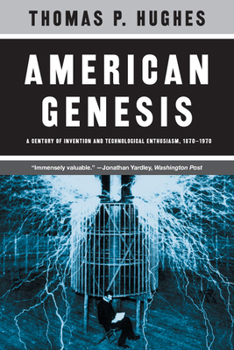American Genesis: A Century of Invention and Technological Enthusiasm, 1870-1970
Select Format
Select Condition 
Book Overview
American Genesis is the book that helped earn Thomas Hughes his reputation as one of the foremost historians of technology of our age. A finalist for the Pulitzer Prize in 1990, the book tells the sweeping story of America's technological revolution. Unlike other histories of technology, which focus on particular inventions like the light bulb or the automobile, American Genesis makes these inventions characters in the chronicle, shaped by and shaping...
Format:Paperback
Language:English
ISBN:0226359271
ISBN13:9780226359274
Release Date:June 2004
Publisher:University of Chicago Press
Length:548 Pages
Weight:1.84 lbs.
Dimensions:1.4" x 6.3" x 8.8"
Related Subjects
Americas Biographical Biographies Biographies & History Biography & History Business & Management Engineering Europe Future of Computing History History & Philosophy Industrial, Manufacturing & Operational Systems Modern (16th-21st Centuries) Patents & Inventions Science Science & Math Science & Scientists Science & Technology Technology WorldCustomer Reviews
3 ratings
Very solid look at how Technology is developed in America
Published by Thriftbooks.com User , 16 years ago
Thomas Hughes provides a critical look at how technology developed throughout the 20th century. The book begins in the 1870's with the inventors workshop and people like Edison gathering machinists around to develop new technologies for profit. This type of work space was based upon proprietary knowledge and combing the skills of those present. It was not a business driven venture on a product but it focused on the business of innovation. From the centers of innovation corporations began to develop their own think tanks and research and development labs. Although the book leaves out the early efforts of Du Pont it does pick up with AT & T and Bell Labs as the forbearers' of corporate research. The military became the other area for innovation as World War I and eventually 2 brought together science and research in a whole new way from the TVA to the Manhattan project. Also included in this new venture was mass production and the scientific management of Frederick Taylor that was employed at companies such as Bethlehem Steel and beyond. The book trails off in the 1970's with the countercultures efforts at rejecting Taylorism and starting into the PC revolution. This book provides an excellent synopsis of these doctrinal shifts in technological production and how they shaped America.
Helpful to better understand technology and its uses...
Published by Thriftbooks.com User , 17 years ago
The title indicates his thesis. "Americans," Hughes writes, "created the modern technological nation; this was the American genesis."(3) The problem he faces is this: Americans see "themselves primarily as democratic people dedicated to the doctrine of free enterprise" rather than, as he does, as builders.(1) Hughes' challenge therefore is to redirect the focus on Americans and their culture as inventors and systems builders. He makes a good case. Hughes articulates a chronology that logically follows the growth of systems. First he discusses the invention of systems, then the spread of large systems, and finally "the emergence of a technological culture, of mammoth government systems, and counterculture reactions to systems."(6-7) American inventiveness and technological enthusiasm characterize the period from 1870 until 1970. In its aftermath there remained a legacy, which Hughes labels as "the burden" of nuclear destruction, environmental concerns, and the wastefulness of wars (he specifically mentions the Vietnam War). Hughes hopes that "those who know the history and [understand] the burden may be able to rid themselves of it or turn it to their ends."(12) In his eyes history has a humanitarian message and he is the oracle. While his focus is on technology, his philosophy is humanistic. Government has a role, but people make the difference. This is how history is valuable. The American experience was unique and his purpose is to elevate people's understanding of their role; indeed, their responsibility. Beginning in 1870, about the time when Alexander Graham Bell invented the telephone in 1876, independent inventors were responsible for a "Gigantic Tidal Wave of Human Ingenuity."(13) The number of patents doubled and, between 1866 and 1896, the number issued to each person nearly doubled. Hughes feels existing historical accounts create an unfair image of inventors, as "one-dimensional heroes."(19) To Hughes this is an inaccurate characterization and he proceeds to redefine them as the cornerstones of technological systems. To make his point he tries to uncover the source of inventor's creativity and motives. They relied on experimentation and their work was characterized by long hours of drudgery punctuated infrequently by "eureka moments."(20) The independent inventors acted on their own free will and followed their own inspirations. They "could not depend on science and abstract theory as guides into the future because they were exploring beyond the front edge of technology and knowledge."(48-49) Hughes tries to understand why independent inventors chose to solve the problems they did and how they went about solving them. He also tried to get into their heads. Based on their work his analysis disclosed two types of inventions. "The system-originating inventions can be labeled radical, the system-improving ones conservative."(53) Examples of the radical inventors are the Wright Brothers, the airplane; Lee De Forest and Reginal
hoping for more
Published by Thriftbooks.com User , 25 years ago
From the Independent innovators, to the beginning of research groups, to military research, to systems creators of Taylor and Ford, to military industrial complex systems of production. The first few and last chapters are the best. Edison had over 1000 patents, I have none. :-(






